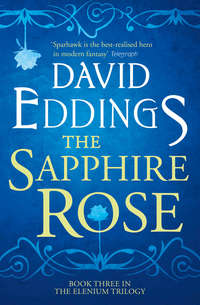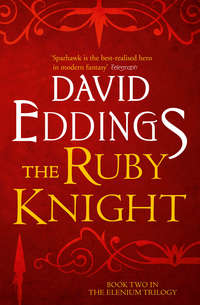
Полная версия
The Complete Tamuli Trilogy: Domes of Fire, The Shining Ones, The Hidden City
‘Why Cardos?’
‘It’s a nice district with mountains and a beautiful coastline. Absolutely perfect climate and industrious, law-abiding people.’
‘You’re not trying to sell it to him, Ehlana.’
‘But I need to know the pertinent details so that I can gush suitably.’
Sparhawk sighed. ‘All right, my Lady, practise gushing then, and come up with suitable stories for the others.’ He looked at Emban. ‘Are your morals flexible enough to stand a bit of falsehood, your Grace?’ he asked.
‘That depends on what you want me to lie about, Sparhawk.’
‘It won’t exactly be a lie, your Grace,’ Sparhawk smiled. ‘If we demote my wife, you’ll be the ranking member of our party. The presence of Ambassador Oscagne here suggests a high-level visit of some sort. I’ll just tell Baron Kotyk that you’re the Archprelate’s personal emissary to the Imperial court, and that the Knights are your escort instead of the Queen’s.’
‘That doesn’t stretch my conscience too far,’ Emban grinned. ‘Go ahead, Sparhawk. You lie, and I’ll swear to it. Say whatever you have to. That storm is coming this way very fast.’
‘Talen,’ Sparhawk said to the boy, who was riding beside the carriage, ‘sort of move up and down the column and let the knights know what we’re doing. A misplaced “your Majesty” or two could expose us all as frauds.’
‘Your husband shows some promise, Margravine Ehlana,’ Stragen noted. ‘Give me some time to train him a bit, and I’ll make an excellent swindler of him. His instincts are good, but his technique’s a little shaky.’
Baron Kotyk’s manor house was a palatial residence in a park-like setting, and there was a fair-sized village at the foot of the hill upon which it stood. There were a number of large out-buildings standing to the rear of the main house. ‘Fortunately, Sir Knights, I have ample room for even so large a party as yours,’ the baron told them. ‘The quarters for the bulk of your men may be a bit crude, though, I’m afraid. They’re dormitories for the harvest crews.’
‘We’re Church Knights, my Lord Kotyk,’ Sparhawk replied. ‘We’re accustomed to hardship.’
Kotyk sighed. ‘We have no such institution here in Astel,’ he mourned. ‘There are so many things lacking in our poor, backward country.’ They approached the manor house by a long, white-gravelled drive lined on both sides by lofty elms and halted at the foot of the broad stone stairs leading up to an arched front door. The baron climbed heavily down from his carriage and handed his reins to one of the bearded serfs who had rushed from the house to meet them. ‘I pray you, gentles all,’ he said, ‘stand not on ceremony. Let us enter ere the approaching storm descend upon us.’
Sparhawk could not be certain if the Baron’s stilted speech was a characteristic of the country, a personal idiosyncrasy, or a nervous reaction to the rank of his visitors. He motioned to Kalten and Tynian. ‘See to it that the knights and the Peloi are settled in,’ he told them quietly. ‘Then join us in the house. Khalad, go with them. Make sure that the serfs don’t just leave the horses standing out in the rain.’
The door to the manor house swung wide, and three ladies dressed in antiquated gowns emerged. One was tall and angular. She had a wealth of dark hair and the lingering traces of youthful beauty. The years had not been kind to her, however. Her rigid, haughty face was lined, and she had a noticeable squint. The other two were both blonde, flabby, and their features clearly revealed a blood relationship to the baron. Behind them came a pale young man dressed all in black velvet. He seemed to have a permanent sneer stamped on his face. His dark hair was done in long curls that cascaded down his back in an artfully-arranged display.
After the briefest of introductions Kotyk led them all inside. The tall, dark-haired lady was the baron’s wife, Astansia. The two blondes were, as Sparhawk had guessed, his sisters, Ermude the elder and Katina the younger. The pale young man was Baroness Astansia’s brother, Elron, who she proudly advised them was a poet in a voice hovering on the verge of adoration. ‘Do you think I could get away with pleading a sick headache?’ Ehlana murmured to Sparhawk as they followed the baron and his family down a long, tapestry-lined corridor toward the centre of the house. ‘This is going to be deadly, I’m afraid.’
‘If I have to put up with it, so do you,’ Sparhawk whispered. ‘We need the baron’s roof, so we’ll have to endure his hospitality.’
She sighed. ‘It might be a little more endurable if the whole place didn’t reek of cooked cabbage.’
They were led into a ‘sitting-room’ that was only slightly smaller than the throne-room in Cimmura, a musty-smelling room filled with stiff, uncomfortable chairs and divans and carpeted in an unwholesome-looking mustard yellow.
‘We are so isolated here,’ Katina sighed to the Baroness Melidere, ‘and so dreadfully out of fashion. My poor brother tries as best he can to keep abreast of what’s happening in the west, but our remote location imprisons us and keeps visitors from our door. Ermude and I have tried over and over to persuade him to take a house in the capital where we can be near the centre of things, but she won’t hear of it. The estate came to my brother by marriage, and his wife’s so terribly provincial. Would you believe that my poor sister and I are forced to have our gowns made up by serfs?’
Melidere put her palms to her cheeks in feigned shock. ‘My goodness!’ she exclaimed.
Katina reached for her handkerchief as tears of misery began to roll down her cheeks.
‘Wouldn’t your Atan be more comfortable with the serfs, Margravine?’ Baroness Astansia was asking Ehlana, looking with some distaste at Mirtai.
‘I rather doubt it, Baroness,’ Ehlana replied, ‘and even if she were, I wouldn’t be. I have powerful enemies, my Lady, and my husband is much involved in the affairs of Elenia. The queen relies heavily upon him, and so I must look to my own defences.’
‘I’ll admit that your Atan is imposing, Margravine,’ Astansia sniffed, ‘but she’s still only a woman, after all.’
Ehlana smiled. ‘You might tell that to the ten men she’s already killed, Baroness,’ she replied.
The baroness stared at her in horror.
‘The Eosian continent has a thin veneer of civilisation, my Lady,’ Stragen advised her, ‘but underneath it all, we’re really quite savage.’
‘It’s a tedious journey, Baron Kotyk,’ Patriarch Emban said, ‘but the Archprelate and the emperor have been in communication with each other since the collapse of Zemoch, and they both feel that the time has come to exchange personal envoys. Misunderstandings can arise in the absence of direct contact, and the world has seen enough of war for a while.’
‘A wise decision, your Grace.’ Kotyk was quite obviously overwhelmed by the presence of people of exalted station in his house.
‘I have some small reputation in the capital, Sir Bevier,’ Elron was saying in a lofty tone of voice. ‘My poems are eagerly sought after by the intelligentsia. They’re quite beyond the grasp of the unlettered, however. I’m particularly noted for my ability to convey colours. I do think that colour is the very soul of the real world. I’ve been working on my Ode to Blue for the past six months.’
‘Astonishing perseverance,’ Bevier murmured.
‘I try to be as thorough as possible,’ Elron declared. ‘I’ve already composed two hundred and sixty-three stanzas, and there’s no end in sight, I’m afraid.’
Bevier sighed. ‘As a Knight of the Church, I have little time for literature,’ he mourned. ‘Because of my vocation, I must concentrate on military texts and devotional works. Sir Sparhawk is more worldly than I, and his descriptions of people and places verge sometimes on the poetic.’
‘I should be most interested,’ Elron lied, his face revealing a professional’s contempt for the efforts of amateurs. ‘Does he touch at all on colour?’
‘More with light, I believe,’ Bevier replied, ‘but then they’re the same thing, aren’t they? Colour doesn’t exist without light. I remember that once he described a street in the city of Jiroch. The city lies on the coast of Rendor where the sun pounds the earth like a hammer. Very early in the morning, before the sun rises, and when the night is just beginning to fade, the sky has the colour of forged steel. It casts no shadows, and so everything seems etched by that sourceless grey. The buildings in Jiroch are all white, and the women go to the wells before the sun comes up to avoid the heat of the day. They wear hooded robes and veils all in black and they balance clay vessels on their shoulders. All untaught, they move with a grace beyond the capability of dancers. Their silent, beautiful procession marks each day’s beginning as, like shadows, they greet the dawn in a ritual as old as time. Have you ever seen that peculiar light before the sun rises, Elron?’
‘I seldom rise before noon,’ the young man said stiffly.
‘You should make an effort to see it sometime,’ Bevier suggested mildly. ‘An artist should be willing to make some sacrifices for his art, after all.’
‘I trust you’ll excuse me,’ the young fellow with the dark curls said brusquely. He bowed slightly and then fled, a mortified expression replacing his supercilious sneer.
‘That was cruel, Bevier,’ Sparhawk chided, ‘and you put words in my mouth. I’ll admit that you have a certain flair for language though.’
‘It had the desired effect, Sparhawk. If that conceited young ass had patronised me about one more time, I’d have strangled him. Two hundred some odd verses in an ode to the colour blue? What a donkey!’
‘The next time he bothers you about blue, describe Bhelliom to him.’
Bevier shuddered. ‘Not me, Sparhawk. Just the thought of it makes my blood run cold.’
Sparhawk laughed and went over to the window to look at the rain slashing at the glass.
Danae came to his side and took his hand. ‘Do we really have to stay here father?’ she asked. ‘These people turn my stomach.’
‘We need some place to shelter us from the rain, Danae.’
‘I can make it stop raining, if that’s all you’re worried about. If one of those disgusting women starts talking baby-talk to me one more time, I’m going to turn her into a toad.’
‘I think I have a better idea.’ Sparhawk bent and picked her up. ‘Act sleepy,’ he instructed.
Danae promptly went limp and dangled from his arms like a rag doll.
‘You’re overdoing it,’ he told her. He crossed to the far side of the room, gently laid her on a divan and covered her with her travelling cloak. ‘Don’t snore,’ he advised. ‘You’re not old enough to snore yet.’
She gave him an innocent little look. ‘I wouldn’t do that, Sparhawk. Find my cat and bring her to me.’ Then her smile turned hard. ‘Pay close attention to our host and his family, father. I think you should see what kind of people they really are.’
‘What are you up to?’
‘Nothing. I just think you should see what they’re really like.’
‘I can see quite enough already.’
‘No, not really. They’re trying to be polite, so they’re glossing over things. Let’s take a look at the truth. For the rest of the evening, they’ll tell you what they really think and feel.’
‘I’d rather they didn’t.’
‘You’re supposed to be brave, Sparhawk, and this horrid little family is typical of the gentry here in Astel. Once you understand them, you’ll be able to see what’s wrong with the kingdom. It might be useful.’ Her eyes and face grew serious. ‘There’s something here, Sparhawk – something we absolutely have to know.’
‘What?’
‘I’m not sure. Pay attention, father. Somebody’s going to tell you something important tonight. Now go find my cat.’
The supper they were offered was poorly prepared, and the conversation at the table was dreadful. Freed of constraint by Danae’s spell, the baron and his family said things they might normally have concealed, and their spiteful, self-pitying vanity emerged all the more painfully under the influence of the inferior wine they all swilled like common tavern drunkards.
‘I was not intended for this barbaric isolation,’ Katina tearfully confided to poor Melidere. ‘Surely God could not have meant for me to bloom unnoticed so far from the lights and gaiety of the capital. We were cruelly deceived before my brother’s marriage to that dreadful woman. Her parents led us to believe that the estate would bring us wealth and position, but it scarcely provides enough to keep us in this hovel. There’s no hope that we shall ever be able to afford a house in Darsas.’ She buried her face in her hands. ‘What shall become of me?’ she wailed. ‘The lights, the balls, the hordes of suitors flocking to my door, dazzled by my wit and beauty.’
‘Oh, don’t cry, Katina,’ Ermude wailed. ‘If you cry, I shall surely cry too.’ The sisters were so similar in appearance that Sparhawk had some difficulty telling them apart. Their plumpness was more like dough than flesh. Their colourless hair was limp and uninspired, and their complexions were bad. Neither of them was really very clean. ‘I try so hard to protect my poor sister,’ Ermude blubbered to the long-suffering Melidere, ‘but this dreadful place is destroying her. There’s no culture here. We live like beasts – like serfs. It’s so meaningless. Life should have meaning, but what possible meaning can there be so far from the capital? That horrid woman won’t permit our poor brother to sell this desolate waste so that we can take a proper residence in Darsas. We’re trapped here – trapped, I tell you – and we shall live out our lives in this hideous isolation.’ Then she too buried her face in her hands and wept.
Melidere sighed, rolling her eyes ceilingward.
‘I have some influence with the governor of the district,’ Baron Kotyk was telling patriarch Emban with pompous self-importance. ‘He relies heavily on my judgement. We’ve been having a deuce of a time with the burghers in town – untitled rascals, every one of them – runaway serfs, if the truth were known. They complain bitterly at each new tax and try to shift the burden to us. We pay quite enough in taxes already, thank you, and they’re the ones who are demanding all the services. What good does it do me if the streets in town are paved? It’s the roads that are important. I’ve said that to his Excellency the governor over and over again.’
The baron was deep in his cups. His voice was slurred, and his head wobbled on his neck. ‘All the burdens of the district are placed on our shoulders,’ he declared, his eyes filling with self-pitying tears. ‘I must support five hundred idle serfs – serfs so lazy that not even flogging can get any work out of them. It’s all so unfair. I’m an aristocrat, but that doesn’t count for anything any more.’ The tears began to roll down his cheeks, and his nose started to run. ‘No one seems to realise that the aristocracy is God’s special gift to mankind. The burghers treat us no better than commoners. Considering our divine origins, such disrespect is the worst form of impiety. I’m sure your Grace agrees.’ The Baron sniffed loudly.
Patriarch Emban’s father had been a tavern-keeper in the city of Ucera, and Sparhawk was fairly sure that the fat little churchman most definitely did not agree.
Ehlana had been trapped by the baron’s wife, and she was beginning to look a little desperate.
‘The estate’s mine, of course,’ Astansia declared in a coldly haughty voice. ‘My father was in his dotage when he married me off to that fat swine.’ She sneered. ‘Kotyk only had those piggish little eyes of his on the income from my estate. My father was so impressed with the idiot’s title that he couldn’t see him for what he really is, a titled opportunist with two fat, ugly sisters hanging from his coat-tails.’ She sneered, and then the sneer slid from her face, and the inevitable tears filled her eyes. ‘I can only find solace for my tragic state in religion, my beloved brother’s art and in the satisfaction I take in making absolutely sure that those two harridans never see the lights of Darsas. They’ll rot here – right up until the moment my pig of a husband eats and drinks himself to death. Then I shall turn them out with nothing but the clothes on their backs.’ Her hard eyes became exultant. ‘I can hardly wait,’ she said fiercely. ‘I shall have my revenge, and then my sainted brother and I can live here in perfect contentment.’
Princess Danae crawled up into her father’s lap. ‘Lovely people, aren’t they?’ she said quietly.
‘Are you making all this up?’ he asked accusingly.
‘No, father, I can’t do that. None of us can. People are what they are. We can’t change them.’
‘I thought you could do anything.’
‘There are limits, Sparhawk.’ Her dark eyes grew hard again. ‘I am going to do something, though.’
‘Oh?’
‘Your Elene God owes me a couple of favours. I did something nice for Him once.’
‘Why do you need His help?’
‘These people are Elenes. They belong to Him. I can’t do anything to them without His permission. That’s the worst form of bad manners.’
‘I’m an Elene, and you do things to me.’
‘You’re Anakha, Sparhawk. You don’t belong to anybody.’
‘That’s depressing. I’m loose in the world with no God to guide me?’
‘You don’t need guidance. Advice sometimes, yes. Guidance, no.’
‘Don’t do anything exotic here,’ he cautioned. ‘We don’t know exactly what we’ll be dealing with when we get deeper into Tamuli. Let’s not announce our presence until we have to.’ Then his curiosity got the better of him. ‘Nobody’s said anything very relevant yet.’
‘Then keep listening, Sparhawk. It will come.’
‘Exactly what were you planning to ask God to do to these people?’
‘Nothing,’ she replied. ‘Absolutely nothing at all. I won’t ask Him to do a thing to change their circumstances. All I want Him to do is to make sure that they all live very, very long lives.’
He looked around the table at the petulant faces of their host’s family. ‘You’re going to imprison them here?’ he accused. ‘Chain five people who loathe each other together for all eternity so that they can gradually tear each other to pieces?’
‘Not quite eternity, Sparhawk,’ the little girl corrected, ‘– though it’s probably going to seem that way to them.’
‘That’s cruel.’
‘No, Sparhawk. It’s justice. These people richly deserve each other. I only want to be sure that they have a long time to enjoy each others’ company.’
‘What’s your feeling about a breath of fresh air?’ Stragen asked, leaning over Sparhawk’s shoulder.
‘It’s raining out there.’
‘I don’t think you’ll melt.’
‘Maybe it’s not a bad idea at that.’ Sparhawk rose to his feet and carried his sleeping daughter back into the sitting room and the divan where Mmrr drowsed, purring absently and kneading one of the cushions with her needle-sharp claws. He covered them both and followed Stragen into the corridor. ‘Are you feeling restless?’ he asked the Thalesian.
‘No, revolted. I’ve known some of the worst people in the world, my friend, and I’m no angel myself, but this little family –’ He shuddered. ‘Did you happen to lay in a store of poison while you were in Rendor?’
‘I don’t approve of poison.’
‘A bit short-sighted there, old boy. Poison’s a tidy way to deal with intolerable people.’
‘Annias felt much the same way, as I recall.’
‘I’d forgotten about that,’ Stragen admitted. ‘I imagine that prejudiced you slightly against a very practical solution to a sticky problem. Something really ought to be done about these monsters, though.’
‘It’s already been taken care of.’
‘Oh? How?’
‘I’m not at liberty to say.’
They stepped out onto the wide veranda that ran across the back of the house and stood leaning on the railing looking out into the muddy back yard.
‘It doesn’t show any signs of letting up, does it?’ Stragen said. ‘How long can it continue at this time of year?’
‘You’ll have to ask Khalad. He’s the expert on the weather.’
‘My Lords?’
Stragen and Sparhawk turned.
It was Elron, the baron’s poetic brother-in-law. ‘I came to assure you that my sister and I aren’t responsible for Kotyk and his relatives,’ he said.
‘We were fairly sure that was the case, Elron,’ Stragen murmured.
‘All they had in the world was Kotyk’s title. Their father gambled away their inheritance. It sickens me to have that clutch of out-at-the-elbows aristocrats lording it over us the way they do.’
‘We’ve heard some rumours,’ Stragen smoothly changed the subject. ‘Some people in Esos were telling us that there was unrest among the serfs. We got some garbled account of a fellow called “Sabre” and another named Ayachin. We couldn’t make any sense out of it.’
Elron looked around in an over-dramatically conspiratorial fashion. ‘It is not wise to mention those names here in Astel, Milord Stragen,’ he said in a hoarse whisper that probably could have been heard across the yard. ‘The Tamuls have ears everywhere.’
‘The serfs are unhappy with the Tamuls?’ Stragen asked with some surprise. ‘I’d have thought that they wouldn’t have had so far to look for someone to hate.’
‘The serfs are superstitious animals, Milord,’ Elron sneered. ‘They can be led anywhere with a combination of religion, folklore and strong drink. The real movement is directed at the yellow devils.’ Elron’s eyes narrowed. ‘The honour of Astel demands that the Tamul yoke be thrown off. That’s the real goal of the movement. Sabre is a patriot, a mysterious figure who appears out of the night to inspire the men of Astel to rise up and smash the oppressor’s chains. He’s always masked, you know.’
‘I hadn’t heard that.’
‘Oh, yes. It’s necessary, of course. Actually, he’s a well-known personage who very carefully conceals his real identity and opinions. By day he’s an idle member of the gentry, but at night, he’s a masked firebrand, igniting the patriotism of his countrymen.’
‘You have certain opinions, I gather,’ Stragen assumed.
Elron’s expression grew cautious. ‘I’m only a poet, Milord Stragen,’ he said deprecatingly. ‘My interest is in the drama of the situation – for the purposes of my art, you understand.’
‘Oh, of course.’
‘Where does this Ayachin come in?’ Sparhawk asked. ‘As I understand it, he’s been dead for quite some time now.’
‘There are strange things afoot in Astel, Sir Sparhawk.’ Elron assured him. ‘Things which have lain locked in the blood of all true Astels for generations. We know in our hearts that Ayachin is not dead. He can never die – not so long as tyranny is alive.’
‘Just as a practical consideration, Elron,’ Stragen said in his most urbane manner, ‘this movement seems to rely rather heavily on the serfs for manpower. What’s in it for them? Why should men who are bound to the soil have any concern at all about who runs the government?’
‘They’re sheep. They’ll stampede in any direction you want them to. All you have to do is murmur the word “emancipation” and they’d follow you into the mouth of hell.’
‘Then Sabre has no intention of actually freeing them?’
Elron laughed. ‘My dear fellow, why would any reasonable man want to do that? What’s the point of liberating cattle?’ He looked around furtively. ‘I must return before I’m missed. Kotyk hates me, and he’d like nothing better than the chance to denounce me to the authorities. I’m obliged to smile and be polite to him and those two overfed sows he calls his sisters. I keep my own counsel, gentlemen, but when the day of our liberation comes, there will be changes here – as God is my judge. Social change is sometimes violent, and I can almost guarantee that Kotyk and his sisters will not live to see the dawn of the new day.’ His eyes narrowed with a kind of self-important secretiveness. ‘But I speak too much. I keep my own counsel, gentlemen. I keep my own counsel.’ He swirled his black cloak around him and crept back into the house, his head high and his expression resolute.







